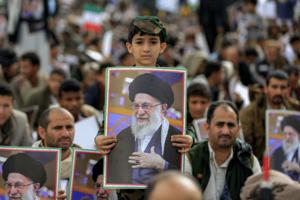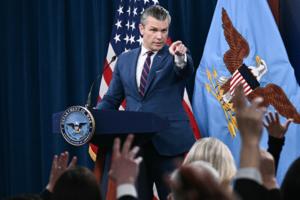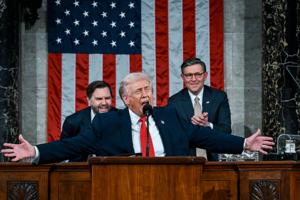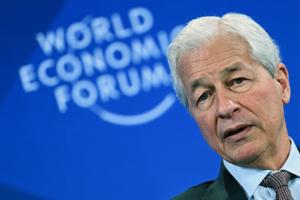Politics
/ArcaMax

Commentary: In wildfire country, EVs aren't a grid problem -- they're a power solution
When wildfire risk spikes in Southern California, the lights often go out before the flames arrive. Public safety power shutoffs have become a grim ritual: Utilities cut electricity to prevent sparking fires, leaving families without refrigeration, medical devices, internet access or a way to cool their homes during heat waves. For many in Los ...Read more

Editorial: White House offers muddled goals in Iran as Congress again stands aside
Can anyone reading this editorial right now explain, clearly and succinctly, why the U.S. is currently engaged in an open-ended military operation against the Islamic Republic of Iran?
If you said yes, congratulations — you’re doing better than the Trump administration. President Donald Trump and his advisers have offered nothing but ...Read more

Commentary: University should fight ruling on trans athletes
On Jan. 28, the Trump administration’s Department of Education Office for Civil Rights found that San José State University violated Title IX of the 1972 Education Amendments when it allowed a transgender athlete to compete in women’s sports.
Further, the Department of Education made several demands, including that the university adopt ...Read more

Commentary: A veterinarian's take on the Iditarod
As a veterinarian whose life purpose is to protect animals from harm and to treat those who need help, it pains me to know that in the coming days, dogs will suffer—and some will likely die—on the Iditarod trail.
Every March, Iditarod mushers make hundreds of dogs run up to 100 miles per day in freezing temperatures on icy trails and ...Read more

Editorial: Illinois' youngest victims deserve more than silence
We’re a society obsessed with kids — how best to educate them, when to introduce technology into their lives, how they eat, sleep and dress. Many of our elected officials are encouraging us to have more of them.
We must also be willing to confront the violence that some of Illinois’ youngest children face.
A data-driven analysis from ...Read more

Editorial: Newsom now has California relying on oil imports
If only the fallout from California Gov. Gavin Newsom’s destructive progressive policies were limited to California.
Newsom is the latest in a long line of Golden State politicians who’ve been overtly hostile to fossil fuels. In 2022, his office applauded a plan by the California Air Resources Board to cut oil usage by 94 percent by 2045. ...Read more

Commentary: It's not clear what this war in Iran is actually meant to achieve
In response to U.S. and Israeli strikes, at least six American service members have been killed and several more seriously wounded in Iranian retaliatory attacks. Missiles and drones have struck U.S. installations in Bahrain and Kuwait, as well as civilian targets elsewhere in the Gulf. The central question surrounding American policy remains ...Read more

Editorial: President Trump must outline his plan following Iran strikes
There should be no mourning the death of Supreme Leader Ayatollah Ali Khamenei and several other members of top Iran leadership killed by joint U.S. and Israeli airstrikes early Saturday morning.
Architect of a brutally oppressive domestic regime that imprisoned, tortured and executed an untold number of Iranians during his 27 years in power, ...Read more

Commentary: Donald Trump's pitiful case for going to war with Iran
As President Donald Trump tells it, the United States had no other option than to launch a large-scale bombing operation against Iran. The threat the Iranians posed to the United States was simply too high; Iran’s history of mayhem inside the Middle East was too long to ignore; and Iranian negotiators weren’t serious about striking a deal on...Read more
David M. Drucker: Don't confuse the Iran war's MAGA critics with most Republicans
There’s a joke circulating in political circles opposed to President Donald Trump that encapsulates the dilemma facing some of his most ardent supporters in the wake of ongoing U.S. military strikes on Iran. The current variation goes something like this: “They told me that if I voted for Kamala Harris, we’d get more regime-change wars in ...Read more

Martin Schram: To the Republic for which we stand
Up at the podium, even knowing the whole world could be watching him, President Donald Trump may well have been bored with himself as he churned through the first half of his State of the Union address.
Oh, he had been dishing his usual load of made-up facts and numbers. And he made his usual claim: “Now we are the hottest country anywhere in...Read more

Editorial: War powers and the weight of the Constitution
The gravest power entrusted to any American president is the authority to command the armed forces. With that authority comes a constitutional tension that has defined our republic since its founding: Congress declares war. The president conducts it.
When an administration moves toward open conflict — deploying forces, launching sustained ...Read more

Adriana E. Ramírez: The war on Iran and the battle at your local bookstore
As a U.S. and Israeli-driven war in the Middle East that may change the world ramps up, it seems strange to care about books. But we have been telling stories as long as we have been conquering and defending civilizations, trying to make sense of the world that surrounds us, to understand how many have survived and made lives in the middle of ...Read more

John M. Crisp: A few more thoughts on Trump's State of the Union address
Can you bear a few more thoughts on President Donald Trump’s much-discussed State of the Union address last week?
Our nation’s views are divided, naturally, between citizens who loved it and those who hated it or at least took issue with parts of it.
Count me among the latter. But if I can find something nice to say about Trump, I ...Read more

Editorial: Trump's impulsive act of warmongering
President Donald Trump’s massive and unprovoked attack on Iran is a war of choice, not necessity. He said as much when he declared his objective to be regime change. That’s far beyond destroying Iran’s warmaking capacity.
Trump started a war with no consultation with Congress, let alone the consent the Constitution still requires. He ...Read more

Editorial: Iran had it coming. Does Trump have a plan to see it through?
The weekend attack on Iran by the United States and Israel can be viewed not as the start of a new war, but rather a fresh battle in the four-decade war on terror, of which the Iranian theocracy has been the principal foe.
President Donald Trump is acting on a long-standing national security challenge, one that previous presidents have ...Read more

Editorial: Iran strikes won't succeed without a real strategy
The president has a long history with Iran: pulling out of the nuclear deal negotiated by his predecessor in 2018, killing a top military commander in 2020, dropping bunker-busters on Iranian nuclear sites last year. What he’s always lacked is a coherent strategy. Having launched the U.S. on perhaps the riskiest gamble of his two terms in ...Read more

Editorial: Economic worries mount, while financial markets churn and companies keep spending. Can it last?
Jamie Dimon, once a resident of Chicago’s Gold Coast and a leader of the city’s business community, has gone on to become the nation’s most influential banker as boss of JPMorgan Chase in New York. Last week, he explained why, like so many leaders of big companies, he is spending today like there’s no tomorrow.
The $2 billion a week in ...Read more

Editorial: SNAP fraud needs fixing, not blame game
When in doubt, blame COVID.
That’s a big takeaway from the state’s response to revelations of fraud in the Massachusetts SNAP program.
As the Herald reported, a 2024 letter showed that President Joe Biden’s administration urged Gov. Maura Healey to clean up the state’s SNAP program, which was recently found by state and federal ...Read more

Commentary: Why the rent-control movement is growing
From Maine to New York to Illinois to California, and many places in-between, a national rent-control movement is rising up — and Big Real Estate is running scared. That’s as it should be, because a successful movement would make it much harder for the real estate industry to rent gouge tenants.
Rent regulations have a long history of ...Read more




















































